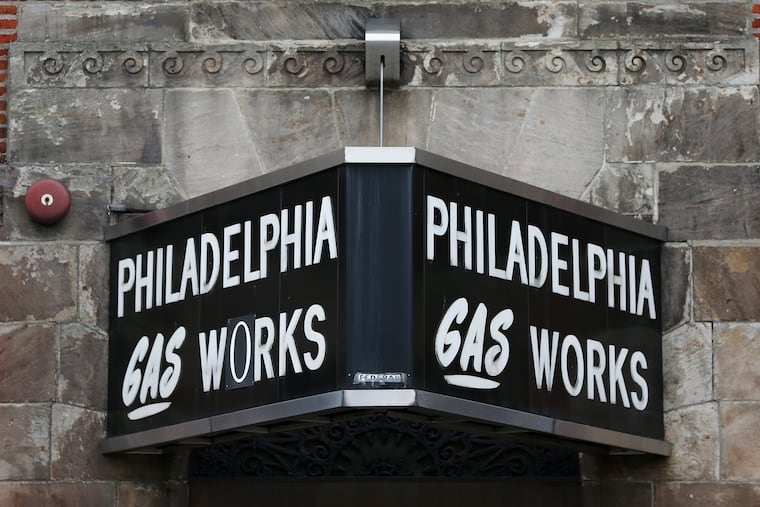Pennsylvania approves 5.2% PGW rate increase, but offers some relief to gas customers hit by pandemic
The rate increase gives $300 bill credits to customers slammed by COVID-19. But the PUC sidestepped demands from environmentalists to force PGW to plan for long-term climate impacts.

State regulators on Wednesday approved a 5.2% rate increase for Philadelphia Gas Works residential customers that will be phased in over the next year, a negotiated settlement that includes onetime bill credits of $300 for some customers slammed by the COVID-19 pandemic.
The rate settlement, approved unanimously by the Pennsylvania Public Utility Commission, gives PGW about half of the increase it sought when it filed its request in February. Rates will go up in three steps the next year — on Jan. 1, 2021, on July 1, 2021, and on Jan. 1, 2022. The three increases combined would boost a typical monthly customer bill by $5.26, from $99.52 to $104.78.
The settlement would generate an additional $35 million in revenue for PGW, which argued it needed the funds to pay for an accelerated gas-main replacement program and to make up for customers using less gas thanks to more efficient appliances and warmer weather. PGW had initially requested a $70 million increase.
The package includes a “COVID-19 Relief Plan” that will pay $300 onetime bill credits to up to 6,660 residential customers adversely impacted by the coronavirus.
Eligible customers include those who are self-employed; households that include a caregiver for someone with COVID-19; households with school-aged children impacted by stay-at-home orders; households with someone who has lost work or is furloughed; and households experiencing financial hardship related to the pandemic.
PGW says it is still developing a process for how to administer the relief, and expects to make it available early in the New Year.
“When we formally announce that the relief is available, customers will be invited to contact us to self-certify their eligibility,” Richard Barnes, PGW’s spokesman, said in an email Thursday.
The $2 million for COVID relief will be paid out of money refunded to PGW by gas transmission line operators, which would typically be distributed to all customers in regular bill adjustments.
The rate increase package also includes a much smaller boost in the monthly fixed customer charge than PGW had initially sought. The fixed charge will increase by 8.4% from $13.75 to $14.90 a month over the next year; PGW had asked for an increase to $19.25 per month, or about 40%. (Like most utilities, PGW generates revenue from customers through a fixed monthly customer charge regardless of the amount of gas consumed, as well as a rate applied to the volume of gas consumed).
Though energy prices have fallen in the last decade, the PUC has allowed gas and electric utilities to charge higher rates to cover the cost of upgrading aging infrastructure. PGW’s rates tend to be higher than other Pennsylvania gas companies because it has a large amount of aging gas mains, and as an urban utility, it also has high social costs associated with a large low-income population.
The settlement was negotiated among PGW, the PUC’s independent Bureau of Investigation and Enforcement, Pennsylvania’s Office of Consumer Advocate, the Commonwealth’s Office of Small Business Advocate, and the Philadelphia Industrial and Commercial Gas Users Group.
Environmentalists, however, declined to sign on to the deal.
The Clean Air Council and the Sierra Club of Pennsylvania had pressed the PUC to force the city-owned utility to prepare a “climate business plan” to reduce greenhouse gas emissions before granting a rate increase. The environmental groups argued that it is risky to allow the PGW to spend money to upgrade infrastructure if ultimately those fossil-fuel investments will have no value in a climate-constrained future.
The commission sidestepped the argument, agreeing with PGW’s assertion that the commission does not have a legislative mandate to force one utility to submit a climate plan upon which its rates would be determined. “We simply find that, at this time, mandating a climate business plan is beyond our primary jurisdiction,” the commission said.
Though the novel effort of the environmentalists was unsuccessful, it represents a new front in a widening pressure campaign to force public agencies to address climate issues.
The Philadelphia Inquirer is one of more than 20 news organizations producing Broke in Philly, a collaborative reporting project on solutions to poverty and the city’s push toward economic justice. See all of our reporting at brokeinphilly.org.